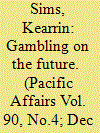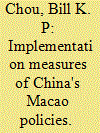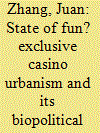|
|
|
Sort Order |
|
|
|
Items / Page
|
|
|
|
|
|
|
| Srl | Item |
| 1 |
ID:
156691


|
|
|
|
|
| Summary/Abstract |
Following the extraordinary wealth generation of casinos in Macau and Singapore, governments and non-state actors across Southeast Asia have developed gambling establishments as a means of fast-tracking economic growth and stimulating national development. Yet, here and elsewhere, casinos have been heavily criticized for their association with immoral behaviour, problem gambling, corruption, and organized crime. In this article, I focus on two casinos in northern Laos to address two research questions. First, I consider how casinos have come to exist within the remote border regions of one of Asia’s least developed countries. I discuss vice economies within the Golden Triangle region, multi-actor aspirations to boost transnational connectivity within continental Southeast Asia, strengthening political-economic relationships between Laos and China, and Government of Laos efforts to use foreign investment as a mechanism for increasing governance capacities in borderlands. Following this, I critically analyze the relationship between casinos and development in Laos. I focus specifically on the multifarious effects of casinos on the lives and livelihoods of local communities to argue that casino development has been informed by logics of expulsion and the establishment of new predatory formations. To make this argument, the article draws on four fieldwork visits to each of the casino sites between 2011 and 2015, desk-based research, and interviews with local residents, casino staff, and members of the Government of Laos.
|
|
|
|
|
|
|
|
|
|
|
|
|
|
|
|
| 2 |
ID:
129282


|
|
|
|
|
| Publication |
2012.
|
| Summary/Abstract |
China has become more proactive in Macao affairs in response to the structural roots of corruption, the spillover of the criminal activities connected to Macao's casinos to the Mainland, and the public resentment to the social costs generated by the rapid development of Macao's casino-based economy. Through various implementation measures, Chinese leadership hopes to strengthen the oversight on the government, improve the communication between the government and the public, and groom the talents of all kinds through structural reform, economic development, and education. These implementation measures involve two lines of thought of Chinese leadership: concentration of Macao's political power in the executive branch and strengthening of Beijing's supremacy over Macao.
|
|
|
|
|
|
|
|
|
|
|
|
|
|
|
|
| 3 |
ID:
156690


|
|
|
|
|
| Summary/Abstract |
In the aftermath of the 2008 global financial crisis, luxurious mega-casino resorts have become spectacles of economic growth across diverse destinations in Asia. With its emphasis on large-scale integrated resorts (IR), the casino and leisure industry is a site of economic rejuvenation even as it offers spaces of moral corruption. Integrated mega-casinos are ambiguous projects of development, driving the speculative processes of place-making for accumulation, social control, and global competition. This editorial introduction focuses on three main themes. First, mega-IR projects show the historical and complicated relations between state power and the gambling economy. Second, Southeast Asia’s new mega-casinos are emblematic of speculative urbanism and its experiments. Third, casino-as-development consolidates the differentiated treatment of citizen subjects and gives legitimacy to the biopolitical governance of citizen practices, claims, and urban participation.
|
|
|
|
|
|
|
|
|
|
|
|
|
|
|
|
| 4 |
ID:
156694


|
|
|
|
|
| Summary/Abstract |
NagaWorld, the only integrated resort and casino in Phnom Penh and touted as the first of its kind in Southeast Asia, currently holds a privileged position in Cambodia’s gaming industry: a unique government agreement for a seventy-year gaming license until 2065 and a casino monopoly agreement for Phnom Penh City until 2035. Its corporate management cleverly leveraged NagaWorld’s special status with the Royal Government of Cambodia (RGC) to facilitate stellar profits. This article analyzes the intersection of NagaWorld’s business history with the political economy of Cambodia from the 1990s. It argues that NagaWorld’s special relationship with politicians can be understood in terms of its status as a new form of “monopoly revenue farm” within Cambodia’s custom of patron clientism. Its viability as a business model for casino capitalism in other areas of Southeast Asia may be limited unless similar monopoly conditions can be replicated.
|
|
|
|
|
|
|
|
|
|
|
|
|
|
|
|
| 5 |
ID:
156692


|
|
|
|
|
| Summary/Abstract |
This paper interrogates the exclusionary politics of casino urbanism in Singapore, especially in terms of how this particular brand of urbanism reproduces disciplinary regimes through the uneven consumption of fun and leisure. Singapore’s vision of becoming a world-class “state of fun” is accompanied by increasingly sophisticated measures of boundary making between global leisure citizens and the excluded others, often comprised of the working class and those deemed to be at risk or lacking self-control and responsibility. The evolving biopolitical borders coincide with the multiple borders set up around Singapore’s casino spaces, ensuring the exclusive consumption of Singapore’s casino urbanism by the wealthy few. The fun regimes help to normalize social exclusion, moralize disciplinary control, and give legitimacy to the new class of global consumers under the operations of the state-capital apparatus. This paper argues that exclusive casino urbanism has broader social and political implications on issues of equality, accessibility, and urban participation.
|
|
|
|
|
|
|
|
|
|
|
|
|
|
|
|
|
|
|
|
|